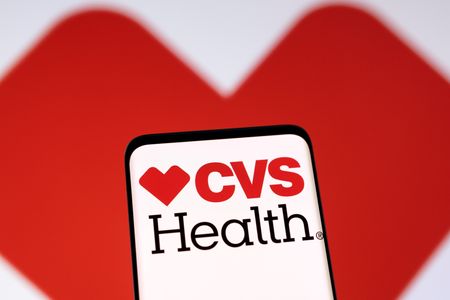 1
1 1
1
By Raghav Mahobe and Leroy Leo
(Reuters) – CVS Health Corp said on Wednesday it would pause its recent acquisition spree as it focuses on integrating purchases of healthcare service provider Signify Health and primary care provider Oak Street Health.
CVS, which has a large retail pharmacy chain, and major health insurance and pharmacy benefit manager (PBM) units, like other healthcare rivals has been looking to broaden the services it offers.
CEO Karen Lynch said CVS will focus on integrating Signify and Oak Street with its other businesses in the near term.
Longer term, Lynch said, the company might look at additional opportunities in technology for home or health services.
Rival Walgreens Boots Alliance in January also said it would not strike new deals in the short term after a spate of acquisitions in the healthcare space.
Revenue and costs related to COVID-19 products and spending eased during the first quarter as the pandemic waned.
Going forward, Lynch said the company expects the COVID vaccine to be an annual shot given in the fall much like the flu shot, and that it will have some COVID home test sales.
Major companies Amazon.com Inc and Walgreens have expanded their healthcare business footprints, especially primary and urgent care, as they look to benefit from growth in the sector.
CVS cut its full-year profit forecast on Wednesday to account for transaction and integration costs related to the two deals, and its shares fell 3%.
The earlier-than-expected closing of the Oak Street deal on Tuesday is likely to result in increased interest costs for the year, analysts said. The deal was initially expected to close later this year.
CVS cut its 2023 adjusted earnings forecast to $8.50 to $8.70 per share from its prior view of $8.70 to $8.90.
Morningstar analyst Julie Utterback said investors might be disappointed that the company pushed down its profit forecast after completing the Oak Street acquisition this week.
Lynch said the early closure could weigh on CVS earnings in the short term, but would also enable the healthcare conglomerate to unlock cost cutting synergies earlier.
The company did beat Wall Street estimates for first-quarter profit and revenue on Wednesday, as a recovery in medical procedures boosted sales of prescription drugs.
CVS reported an adjusted profit of $2.20 per share for the first quarter, topping analysts’ estimates by 11 cents, according to Refinitiv data.
(Reporting by Raghav Mahobe and Leroy Leo in Bengaluru; Additional reporting by Caroline Humer in New York; Editing by Anil D’Silva and Bill Berkrot)